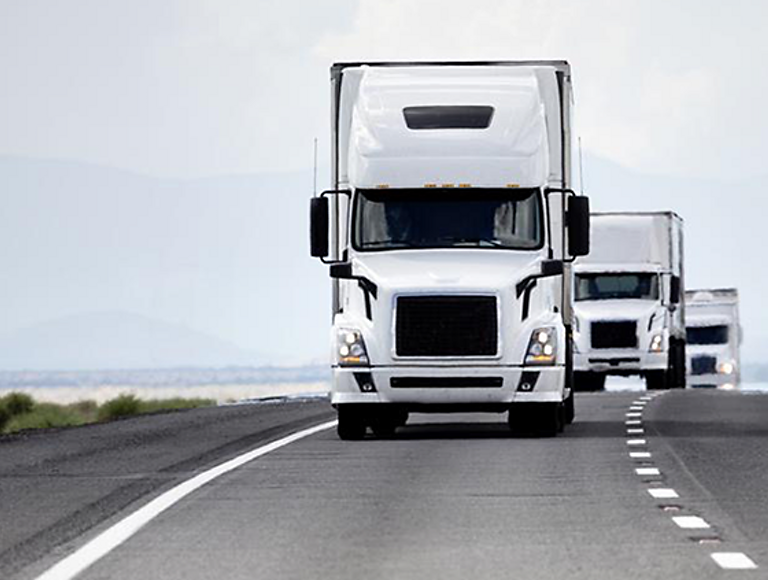With 5G, next-gen fleet management, asset tracking, and last-mile delivery tracking is poised to revolutionize how products get from factories to customers.
Let's take a closer look at these three aspects of the supply chain:
Greater insights into fleet management.
Traditional fleet management and telematics tools allow you to plot and track driving times and routes using a physical device that's plugged into each vehicle. These devices then connect with an app that provides managers with access to vehicle data and enables communication with the driver.
With 5G-based solutions, devices will deliver more functionality to users that will make their jobs easier, like live driver coaching and dynamic fleet management based on real-time shipment data and weather conditions.

5G could allow autonomous semis to travel close together over long distances in “platoons,” reducing drag and fuel consumption.
5G connectivity could also empower transportation and logistics companies to use diagnostic data in real time, with digital dashboards and metrics that provide insights into driver behavior as well as route and fuel efficiency. With the use of smart sensors and onboard computers that monitor and transmit position, speed, fuel consumption, vehicle wear, and component failure, organizations can improve operational efficiency across the board. Additionally, data can be captured, analyzed, and viewed wherever the assets or the central office is located.
"Platooning" is another potential use case for 5G. By allowing trucks to travel on a highway with vehicle-to-everything (V2X) communications and autonomous technology maintaining a fixed gap between them, they could form coordinated, identically spaced convoys that can drive in close proximity over long distances—reducing drag, lowering fuel consumption, and cutting costs. The European Automobile Manufacturers’ Association projects found that platooning could reduce the CO2 emissions of vehicles by up to 10% and offer safety benefits.
Improve asset tracking.
77%
of firms are estimated to have limited to zero visibility into their supply chains.
For overseas container shipments, the assets can even be tracked at the seaport. Several ports around the world, including one in Seattle, now use private 5G networks that allow completely autonomous movement of cargo within the port.
By using intelligent tagging for products and components, logistics tracking companies can continuously update factories on the progress of deliveries. Any gaps in supply chain visibility can easily be identified and mitigated before they become a problem. For example, if certain parts are delayed, the 5G factory could be notified and may be able to automatically adapt its schedules and priorities to compensate.
Tracking last-mile delivery.
Large-scale logistics is just one way 5G can help improve operational efforts, but it can also build efficiencies into last-mile logistics for local deliveries. By coordinating deliveries using 5G-enabled drones, a company that, for example, graduated from the
Supply Chain 4.0 for consumer goods will include a flexible transport capability, modeled on ride-sharing technology, that can potentially increase agility in distribution and introduce new direct-to-consumer and drop shipping opportunities.
With e-commerce sales having risen dramatically over the past year, from 13% to 17% across the retail spectrum, according to McKinsey, tracking and delivering goods to end customers has become more granular. This provides another opportunity for 5G to step in and streamline the process. McKinsey is forecasting that this Supply Chain 4.0 for consumer goods will include a flexible transport capability, modeled on ride-sharing technology, that can potentially increase agility in distribution and introduce new direct-to-consumer and drop shipping opportunities. Supply Chain 4.0 could become more efficient and flexible than existing systems if it is able to take advantage of the 5G-enabled Internet of Things (IoT) and what it has to offer.
It all adds up to better customer service.
Using Artificial Intelligence (AI) and 5G to aggregate and analyze data from production, logistics, and sales channels will allow organizations to introduce increased levels of automation across all stages of a cloud-based supply network. Predictive planning could reduce lead times by allowing finished goods to move to the next stage in the supply chain even before an order has been placed. For a broader perspective, consider this: a transformed supply chain using smart product tags could use 5G to help ensure security, quality control, customer follow-up and after-sales service—and even facilitate eco-friendly disposal at the end of the product’s journey.
Regardless of industry, a nationwide 5G network lays the foundation for businesses to take important steps and create what’s next. From more productive field operations to more efficient supply chain management, 5G delivers a platform for innovation that can transform how a business operates – both profitably and at scale.
